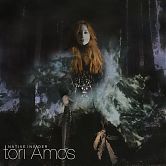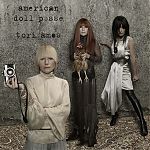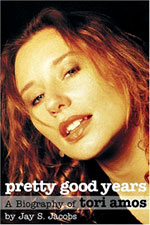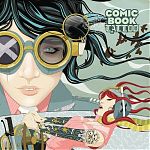- Articles
- Cherries
- Minutiae
- Q&A
- RAINN
- Releases
- Reviews
- Site News
- Them
- Toriphiles
- Touring
- TV/Radio/Web
- Video
News Archives
Keep an eye on our Twitter and Facebook pages since we often post quickie updates there when we're on-the-go.
During tours, we do our best to cover setlists in real-time on Twitter. If you want to tweet a show in, just DM or @ us on the day and tell us to watch your stream that night.
Tori is touring in 2017 to support the release of Native Invader. The European legs runs from early September through early October and the North American leg runs from late October to early December. We do not know if additional dates elsewhere will be added.

Native Invader (album, 2017)

Unrepentant Geraldines (album, 2014)

Gold Dust (album, 2012)

Night of Hunters (album, 2011)

Midwinter Graces (album, 2009)
 Abnormally Attracted To Sin (album, 2009)
Abnormally Attracted To Sin (album, 2009)
Live at Montreux 1991/1992 (DVD, 2008)

American Doll Posse (album, 2007)

A Piano (boxed set, 2006)

Pretty Good Years
(bio, 2006)

Fade To Red
(DVD, 2006)
 Comic Book Tattoo (book, 2008)
Comic Book Tattoo (book, 2008)News: Out Interview (July 15, 2008)
Joseph Campbell was always saying that the myths are always alive in us, but religion has repressed this. So the myth that we have been forced to adhere to is the Christian myth and where is the homosexuality in the Christian myth? And where — for women — is the woman who has her sexuality and has her spirituality in the Christian myth? The Gnostics believe that all this was in Christ’s teachings and yet, it got edited out when it was taken over by the patriarchy. So, therefore, mythology is something that we’re starving for. These are our stories — this is in our DNA.
Noah Michelson interviewed Tori for Out magazine and the piece was published on the Out.com today. In the article, Tori and Noah discuss The Light Princess musical in some detail, her family, archetypes and myth, and, as Perez was quick to point out, Perez Hilton.
Thanks to Shannon and Amanda and everyone else for the heads-up!
Taken By The Throat
For Tori Amos, there is no escaping the creative life — and she wouldn’t have it any other way.
By Noah Michelson
Tori Amos, a former child prodigy — she’s been pummeling the piano since she was two-and-a-half — got her first big break (and garnered her first queer fans) as a teenager playing the gay bars of Washington D.C. After moving to LA in the mid-’80s, Amos killed a few years in the ill-fated hair band Y Kant Tori Read (get it?) before emerging as “the girl with a piano.” Her riveting keyboard-centered autobiographical songs have amassed her a following dedicated enough to rival any garden variety jam band.
Over the past 15 years, Amos has sold more than 12 million records; covered everyone from Nirvana to Eminem to Kylie Minogue in concert; created RAINN (Rape, Abuse & Incest National Network), the nation’s largest anti-sexual assault organization; and continued to push the scope of her musical output. She shamelessly flirts with rock, rap, techno, and country — all the while staying true to her first love, the piano.
Amos recently phoned us from her home in Cornwall, England, and though we didn’t get a chance to chat about her recent split from Epic Records — a move that finally aligns her independent artistry with independent industry — or Comic Book Tattoo, a 480-page, full color comic anthology based on her songs, due out from Images Comics on July 23, she did give us the dirt on the musical she’s writing, her daughter’s and her father’s gay learning curve, and what she really thinks about Perez Hilton.
Out: Everyone knows the story of how your father, the minister, took you to play the piano in the gay bars of Washington D.C. when you were 13 years old, but I’ve always wondered if he ever formally sat you down and explained exactly what was going on with the patrons of those bars.
Tori Amos: You mean have I sat him down and explained what was going on in those bars.
So, you knew?
In retrospect, it’s all very clear to me now. At the time, he was battling parishioners — in the Protestant system they have a thing called the Board of Trustees, where the parishioners have power over the minister. There’s a thing called the Pastor-Parish Committee and they can sit and pass judgment on the minister. So, he was taking me to these bars and got a lot of flak for it. I remember this conversation he and my mother had in the kitchen and he had said [the parishioners] were in shock and horror that he could take his daughter to such a sinful place. And he said, “I said to them, Mary, a gay bar is the safest place for a 13-year-old girl to be! What, are they nuts?” So, I think on that level he was very clued in that it was a very nurturing place for me. I think he has a side to him that’s always been a little regretful that he didn’t have another path in life. He chose this path because my grandmother, who was a minister as well and a schoolteacher, made him to see the error of his ways wanting to become a doctor and — these are my words — guilted him into being a minister. He’s always stood by the idea that he was called by the Lord, but I’m saying he was threatened by my grandmother. There’s a side to him that’s always loved movies and music — he’s tone deaf, but he’s always loved it. He’s learning to play piano and he’s 80 years old. He just took it up this year.
Are you giving him some pointers? Or are you staying out of it?
I’m staying out of it. It’s really cute — he’ll say, “Have you ever heard this chord progression before?” And I’ll say, “I’m so thrilled you’ve discovered it. That’s really exciting!”
So he’s still hovering around the “Hot Cross Buns” level?
I would say “Hot Cross Buns” is where he is. But there is a side to him that, if he can get away with it, he flirts with danger. The fact that Kevyn Aucoin [the late celebrity makeup artist and one of Amos’ close friends] would stay at [my] beach house with different lovers at different times — I think that’s the way that my dad can be exposed. [He would] pop down and have a cup of tea and hang out with that other quote unquote lifestyle that isn’t sanctioned by the Church.
But there must be some tension between those two sides of his life?
I think there must be. For instance, he edited one of my music books, because I was on the road and I couldn’t do it that year. When I say edited — he had nothing to do with the manuscript. It was about picking what songs ended up in the anthology. He works for my publishing company. He and my mother have worked for it for years and years and have made sure everything was done correctly — and they’ve done a really good job because they’re fair people. But when it came down to him choosing which songs are in the anthology, anything he might have disagreed with didn’t end up in there. So there’s no “Crucify,” there’s no “Father Lucifer,” — I’d be shocked if there’s “Icicle” on there with the masturbating. I don’t think so. That is the side to him, on one hand, where you’ll meet up with the minister that stands in judgment. And then you’ll meet up with the other one who will sit and quite happily talk to a gay couple. He won’t walk out of the room and say, “Tori Ellen, how can you have them in your house doing you-know-what?” He’s not like that. So you have to kind of think, “Well, then, there are two sides to this guy.” It just depends on which one you run into.
Have you had a talk with your 7-year-old daughter, Natasha, about your gay friends?
Oh no. She knows all about them.
Because she grew up with them around? It was never an issue?
She’s very aware that some boys stay with boys forever and marry them. And some girls stay with girls and marry them. And it’s the way it is. But the thing about Tash is that she and Granddaddy Eddie see religion very, very differently. She believes that God from the Bible is not Jesus’ father. She feels that God is — I’ll use the word “underachiever.“ She says things like “He likes war. He’s not for woman’s rights.” So in her mind God of the Bible is more like George W. Bush. That’s how she sees it. And that — to her — is not Jesus’ father. And this is where their relationship goes off into different tangents. Tash’s religion would be considered something that is not Western.
But Jesus is still a part of her religion?
No. She thinks that Jesus was a good teacher and had some really good things to say. But she says, “Did he walk on water? Did he not walk on water? Does it matter? Was he a nice guy — and was he good to children?” I said, “I think he was good to children.” And she said, “Well, that’s all that matters!”
What kind of a role have you had in shaping her beliefs?
She did say to me the other day, “If I’d been a boy, do you think I’d be gay?” I said, “How do you figure that?” And she said, “There’s no way that if you’re your child, mother, that you’re not going to go shopping and do makeup.” That’s what we do — we do shopping and we do makeup. We do our nails.
Lots of shoe shopping going on in that household.
Also spa time. She’ll say, “I own a spa. So it’s time for us to play spa now.” She’ll do the whole facial thing. She’s into that side of the pampering. She said to me, “If I was a boy, there’d be no way I’d be out there digging up worms. I’m going to be shoe shopping and trying to figure out which Charmed sister I am — Prue, Phoebe,” whatever they’re called.
It’s funny though because you love your 4×4s. I think you could have had a little macho boy.
I think I could have too. I don’t know if other people think I could’ve. I thank you for your belief in me, but I wouldn’t mind if I had a son that was gay. That’s the thing — to me, I think that people are born this way.
And who’s to say you couldn’t have had a macho little gay boy who grew up to love 4×4s and going to the spa?
How great would that be?
I would marry him if he existed.
Wouldn’t that be good? I could be a foster mom. The thing is — I feel like my relationship with Tash is really great and being a good mom takes so much effort. And also being a composer, because that’s another whole set of children. When I’m not being a mom to Tash, I’m in my mind composing. Composing is a huge part of my life.
You just came off the road about six months ago from promoting American Doll Posse and already it seems like you’re working on 4,000 different things. Do you thrive on being busy?
I live a creative life. It’s not my job. There are aspects to what I do that I think are more job definable, but creating isn’t one of them. There are parts of the creative process that get challenging and that sometimes feel as if it can become work. When you’re in a place of delivery, when you have to deal with the business side of it, it can seem like work. But if you don’t deal with that side then it’s all unsustainable. You still have to get everybody paid. Even though there are people to deal with that, you have to make sure that the choices you’ve made will make this happen. I live my life like this — I don’t think “when do I get a break from creating?” And some projects take you by the throat and say, “You thought you were doing a musical and you were doing the comic book, but guess what? You’re doing me as well!”
You want to talk about that?
No! I can’t! It’s brewing!
Well, how about the musical? There have been rumblings about it for the last few years, but now you’re really in the trenches getting it done?
I’m in the trenches. I’m delivering act one to the British National Theater in July. I have the guys in the mix room at Martian Studios now mixing one of the many pieces that have to be submitted into act one. The playwright Samuel Adamson — he adapted All About My Mother for the stage — that’s who I’m working with.
So what was the process? Was the idea yours and you brought him along? Was it totally collaborative?
I told a few people at CAA. My music agent — I’ve been working with her since the ‘80s, if you can believe that — said, “Alright, if this is really what you want to do, then let’s get that department involved.” Cut to loads and loads of these “properties” being stacked in front of my eyes and I start to go through them and finally I put my hands on this one called The Light Princess and I say, “This is the one for me.” It’s a book from the 19th century and another client at CAA had the property. So we got along and then it went to the next stage. We went to producers on Broadway and they practically laughed me out of the room saying, “Who’s doing the book? Who’s doing this? Who’s doing that?” or “Until you have this, we can’t talk.” And I said “OK, but I’m coming to you so that we can work together and you put it together — can’t you see that idea?” “No. That’s not how we do it.” So the last stop was the British National Theater. We flew into London and sat down with Nick Hytner who runs the National, and he said, “I want you to meet with some of my team.” Part of the team was Samuel Adamson. So I brought the project to the National and then Sam and I started to go back and forth and hammer out the concept. And then he writes the book and I’m writing the songs. And it’s very collaborative — he’s great to work with. He and I have been working on this, on and off, for two or three years.
When do you think you’ll be done?
Well, the goal is that we’ll be in workshop before Christmas. The goal is that it will open at the National late 2009 or early 2010. It’s really involved.
It seems like a logical extension of what you already do — a lot of your albums have very strong narrative arcs to them. It seems like something that would come naturally to you —
Naturally is a good word. But I set myself some benchmarks. For instance, there were certain sonic bibles, certain musicals I surrounded myself with — West Side Story being one of them. I felt like if I were going to do this, then I wanted there to be a representation of different styles of music, not just, “Well, it’s an ‘80s-themed musical,” or, “It’s a takeoff on the ‘50s.” I wanted music to span from all of the 20th century and into the 21st century. So that has taken a lot of time. It isn’t something that I’ve done as a hobby — it’s something that I’ve done for eight hours a day since I got off the road.
But it sounds like it’s immensely satisfying.
Ask me that in a year. [Laughs] I mean, on some level, working with Sam is great. That’s fun. But I’m not just handing in piano/vocal demos. I’m handing in full percussion. I had Phil Shenale arranging a couple, so there are orchestral arrangements — on boxes, not with live pieces because I’m funding this out of my own pocket. When you’re commissioned by the National, they don’t pay you. You don’t get paid unless you’re selling tickets and there are people coming in.
So you have to go into it blindly just hoping for the best, then?
Really. And you have to realize that they can pull out at any moment.
That’s got to be nerve-wracking.
Yah, it is. But I will say the greatest thing about working with someone like Sam is that they will — the key word when you’re working with them is development. They’re really great about that. When I went to some of the Broadway producers, the idea of development and a workshop and that structure was not in their definition of how to bring a show onto the stage. And logically I couldn’t understand why it’s not part of it, because now that I’m a part of this process, it’s a solid process.
You once said that that Strange Little Girls was your “Cindy Sherman moment.” Would it be fair to say American Doll Posse was your Lady Bunny moment?
[Laughs] I guess you could say that.
I think there was something very drag about what you were doing — and when I say drag I mean that in terms of camp, but also performativity. The shows on the last tour were so much more theatrical than anything you’ve ever done before.
Yes. If Ziggy Stardust is a drag moment then I’ll agree with you.
There are a few fans who are writing books about Tori Amos fan culture, there is another fan who is shooting a documentary — someone is even compiling a book of fans’ dreams about you. What is it about you that inspires this?
Well, yes, and then there are some people who will come to the shows and listen to the music and that’s the extent of their involvement, and that’s OK too. There are those people who don’t go online but they might want to come to a show. And they’re always welcomed. That’s the idea — this is not a closed party. The door is open and there isn’t the idea of the velvet rope. I don’t agree with that. People can drop in and drop out and drop by, and there’s always going to be a fire ceremony going on and the circle will widen to let you in. The songs are very much about me being a container — and yes, I have my opinions about what they’re about. But they also go out and have relationships with people. What I do contains a lot of archetypal reference. And I think ultimately, people are trying to decipher what archetypes they carry. In some ways, you can say we care all of them if we want to — if we want to explore them — but I would say at different times you carry a different ratio. That was the whole idea of American Doll Posse — some of the key players are from the Greek pantheon — for the women. You could do it for the men as well. You could pull the main players of the male side of this and you yourself could start investigating how much Apollo, how much Zeus, how much Dionysius you have, given where you are in your life. And I find that mythology is something that can be current. Joseph Campbell was always saying that the myths are always alive in us, but religion has repressed this. So the myth that we have been forced to adhere to is the Christian myth and where is the homosexuality in the Christian myth? And where — for women — is the woman who has her sexuality and has her spirituality in the Christian myth? The Gnostics believe that all this was in Christ’s teachings and yet, it got edited out when it was taken over by the patriarchy. So, therefore, mythology is something that we’re starving for. These are our stories — this is in our DNA.
And you see the doll concept as a vehicle to express yourself? I think there were some fans who weren’t entirely happy with the direction you went — a kind of chorus of “We want Tori Amos. We don’t want Tori Amos dressed up in a wig as a doll or as a persona,” sprang up. Do you think they misunderstood where you were coming from?
They’re all Tori.
And this was a framework to explore your different sides? Is that fair to say?
If you think about what we just talked about, that each woman or each man carries a character type within in them from a pantheon — some people say, “You are an Athena.” Well I would say, “Let’s look at these as modern stereotypes that Tori is one way.” No. She expresses herself in one way. But there are other sides to the woman that maybe don’t fit into the popular image. There are other facets that are true and real and exist.
It reminds me of Sex and the City and the theory that if you put the four characters in that show together Voltron-style you’d get a “complete” woman. Is what you’re talking about similar?
But based around an archetypal strategy opposed to a modern stereotypical definition.
Which is something you’ve always been interested in. I think the archetypes have always been there — Boys for Pele was filled with them.
Yes, but to say, “Hang on a minute.” You can get trapped in an image. And people can trap you in an image. Think of — whoever you are, reading this article — think of your friends that turn around and say, “I don’t like you this way. I don’t like this look on you.” Well, fuck you! If you’re a real friend, why would you stifle your friend’s exploration? But a lot of times we like our friends a certain way. And instead of them maybe finding that confrontational streak — not that they become a bitch, because I don’t see Pip [one of Amos’ personas from American Doll Posse] as a bitch — I see that she has no problem being a warrior. And she has no problem discussing things that other people would shudder from. And she’s not looking for a man. Or a woman. She’s not looking for an other. Knowledge is what she’s married to and she doesn’t think that she’s defined by a soul mate. She carries Athena. And that fascinated me — working with that energy — because she doesn’t need everybody to like her. That’s what I liked about her and she can talk about things that will upset people. Ultimately Tori as an essence — as an image — tries to make things OK. And you can’t always make things OK — certain things are not going to be OK. So, whether you see these characters taken to their full expression, which was taking it all the way into the physicality — not just the sonic — those women live in here now forever.
Will they show up again? When you perform in Belgium later this summer will they be there?
No. That will be Tori as a one-woman show. But will they show up again? We’re making a DVD — we filmed that. And there is a lot to their life that happened off stage. It’s hard to know in life how a story chooses to end itself. All good stories have to end, but sometimes there needs to be a yearbook if you will.
I know Perez Hilton is a big fan of yours — is the feeling mutual? Do you think he and his cohorts work for the forces of good or the forces of evil?
I don’t go on the website all the time because I’d never get anything done if I did, and he knows that. But when the lights are off and you’re just sitting and talking to him he’s a wonderful force.
So you two are friends?
We’re acquaintances. We’ve met. I think he can have a very sharp blade — there’s no question about that. And there’s a persona there — that’s why somebody like that becomes bigger than life by talking about what other people are doing. That is his art form — talking about what other people are doing. Now when you do that, you can’t always be complimentary or it’s not sustainable. There is no career there. So if you’re one of the sacrifices along the way, it can’t feel good. It just can’t. But I think that if he weren’t doing it somebody else would be doing it. There’s always going to be somebody who’s commenting on celebrities.
And there’s something about his particular brand of panache or style that you can get behind?
I think he’s funny, but more than that, he’s very smart. He’s scary smart. And that’s why this is occurring — because he’s extremely intelligent. No different than Brian — Marilyn Manson. I don’t know him personally but I know people who’ve worked with him. A highly intelligent individual that created Marilyn Manson, a very smart person. Sometimes people forget that when they talk about the panache — that sometimes really distracts, intentionally, and masks you from the mastermind. But there is a huge mastermind that lives in Perez. And some people would find that very calculating, but then anybody that’s really good with concepts has to know that the concept is airtight. And if you have a good concept, you’ll inspire hate as well as ecstasy. Because if it’s just OK, nobody gets hard. It’s just one of those things — it can occur while you’re at the dentist — it doesn’t matter. But if it pushes those buttons in some way, then you have to know it’s a fucking great concept but it might not be what the public wants all the time. That doesn’t mean they’re right. When it comes to art, the public isn’t always right. The public likes what they like for all kinds of reasons. And sometimes it’s, “It’s just because I want it this way!” But that doesn’t mean it’s the most exciting choice.


